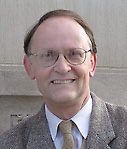Ancient manuscripts that discuss Plato and Aristotle, buried for centuries in the lost Roman seaside town of Herculaneum, provide insights on how violent television programs, films and video games may affect young minds, says Richard Janko, the Gerald F. Else Collegiate Professor of Classical Studies.
The 2,000 year-old manuscripts, burned and buried by a volcanic eruption and able to be read only with the help of space-age technology, reveal that ancient thinkers like Plato and Aristotle pondered deeply how we learn from works of the imagination, and how that learning can shape our characters, he says.

Photo courtesy Richard Janko.
Janko, one of the most influential living scholars of ancient Greek literature and culture, will discuss the connection between the philosophers and the effect of media violence on youth at 4 p.m. March 8, when he delivers the Henry Russel Lecture 2011 in the Rackham Amphitheatre. The free public lecture titled “Expanding the moral imagination: ancient insights on modern media from the lost books of Herculaneum” is followed by a reception.
The Henry Russel Lectureship, established in 1926, is awarded each year to a U-M professor in recognition of exceptional achievements in research, scholarship and/or creative endeavors, and an outstanding record of teaching, mentoring and service. It is one of the university’s highest honors for a senior member of its active faculty.
“Aristotle had a theory that we learn to be virtuous by being habituated to be virtuous and that literature gives us emotional experiences that we would not have in real life,” Janko says. “The corollary to that is that people can also be habituated to violence. Aristotle felt this applied to young minds. Although adults might be able to handle such situations, young people should not be exposed to them because they may affect them. I saw this recently when I sat next to someone in a library, who was playing a violent video game, and realized that he was being trained to shoot.”
The recent shooting of U.S. Rep. Gabrielle Giffords outside a Tucson supermarket provides another possible example of the link between conditioning and violence, Janko says. “It could be argued that such shootings might be related to people being habituated to violent behavior.”
Janko is the author of numerous books on Greek language and literature. He contributed a volume to the Cambridge commentary on Homer’s “Iliad,” which is considered the best in a five-volume work done by four leading scholars. His edition of Philodemus’ “On Poems” Book 1 won the Goodwin Award of Merit, the prestigious book prize of the American Philological Association.
He earned a Bachelor of Arts (1976), Master of Arts and a doctorate (1980) in classics from Cambridge University (Trinity College). He taught classics at Columbia University, New York; the University of California, Los Angeles; and the University of London before joining the U-M faculty in 2002. He served as the chair of the Department of Classical Studies for five years.

